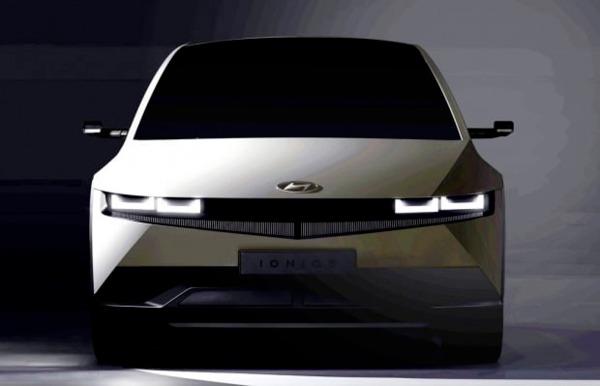IONIC 5, produced 10 right-handle pilot vehicles
“Aim for the Japanese market”
Prospects for mass production after verification

Hyundai Motor Company started to produce a right-handle model for the electric car Ioniq 5 to advance into Japan. Photo = Hyundai Motor Company
Hyundai Motor Company has begun preparatory work to introduce the electric car’Ioniq 5’in the Japanese market. Hyundai Motor Company(245,000 +3.59%)In the near future, it is expected to re-enter the Japanese market, which was withdrawn in 2009.
According to the automobile industry on the 11th, Hyundai Motor Company started to produce the’right handle model’ of the exclusive electric car Ioniq 5 to be released next month. Hyundai Motor Company produced the molds necessary for the Ioniq 5 right handle model through its partners, and received 10 right handle parts. Based on this, it is reported that the pilot vehicle will be built on the 16th of this month.
An official from a partner company said that the righthandle Ioniq 5 model, which is scheduled to be produced, was aimed at the Japanese market.
An official from a Hyundai Motors partner said, “We are promoting the assembly of the Ioniq 5 right-handle model pilot vehicle with the Japanese market in mind.”
It is said that Hyundai Motor Company will first go through quality and safety inspections and test runs with 10 pilot vehicles, and then go ahead with the official launch of the Ioniq 5 right-handle model through supplementation.

Hyundai Ioniq 5. Photo = Hyundai Motor Company
In the automobile industry, Japan is in fact the only overseas market for right-handle vehicles that currently has sufficient demand for eco-friendly vehicles. Therefore, it is analyzed that the Ionic 5 right-handle model is a paving stone for re-entry to the Japanese market.
Currently, 92 countries, including major automobile markets such as the United States and Europe, have adopted a left-hand drive vehicle with the driver’s seat on the left as a standard. Although 44 countries have adopted the right-hand drive, only Japan, the United Kingdom and Australia can expect demand for electric cars that are more expensive than internal combustion engine cars.
Even so, it is evaluated that the market size is limited outside of Japan. In fact, GM Korea’s parent company General Motors (GM) decided to withdraw from the righthandle markets last year in the UK, Australia, New Zealand, India, Thailand, and South Africa to enhance profitability. However, Japan, a representative right-hander country, was not included in the decision to withdraw.
With the Ionic 5 right-handle model, Hyundai Motor Company is expected to have an opportunity to wash away the humiliation it suffered in the Japanese market. Hyundai Motor Company, which entered Japan in 2001 and sold passenger cars, closed the passenger car business in 2009 due to sluggish sales. This is because the local brands such as Toyota, Honda, and Nissan were strong, and the market had a lot of light car sales due to strict government regulations. Currently, only commercial vehicles and research and development (R&D) organizations remain in Japan.

Last year’s sales ranking of electrified vehicles (pure electric vehicles + plug-in hybrids) by brand, compiled by EV Sales. Photo = EV Sales
However, in the recent electric car era, Hyundai Motors has been receiving good news to consider re-entering. This is because the Japanese government has implemented policies to promote the spread of electric vehicles, such as expanding subsidies for electric vehicles, and expanded related infrastructure such as charging stations. In addition, it is an advantage to Hyundai that the Japanese brands’ status in the electric car market is shaking. This is because, while focusing on hybrid engines based on internal combustion engines with high technology, they failed to compete in electric vehicle competition in time.
The sluggishness of Japanese car brands is also revealed in the sales rankings of electrified vehicles. EV Sales, a Swedish eco-friendly vehicle information provider, compiled worldwide sales of electric vehicles including plug-in hybrids (PHEV) last year. Tesla’Model 3′, which sold 36,5240 units, took first place, and Hyundai Motor’s’Kona EV’ also ranked fifth. Nissan’Leaf’, which was ranked 3rd last year, collapsed to 7th place, while Mitsubishi’s Outlander PHEV collapsed from 7th to 19th.
Japanese brands also performed poorly in the manufacturer rankings. With Tesla in the first place, Hyundai Motors ranked 11th and Kia 12th. The Japanese brand Nissan fell from 7th to 14th last year, and Toyota also fell from 10th to 17th. Mitsubishi did not make it into the rankings.

Ionic 5 back view. Photo = Hyundai Motor Company
Although Toyota has secured a number of patents related to all-solid-state batteries, there are many views that it is difficult to develop a finished vehicle right away. The industry believes that Toyota’s technology will only take a lot of time to proceed to actual vehicle development or mass production as the technology is at the laboratory level. This is the reason for the observation that if Ionic 5, which is manufactured based on the electric vehicle platform E-GMP and has high efficiency, enters Japan, there will be virtually no local model that can compete.
An industry official said, “In Japan, there are only general-purpose electric cars that have been modified from existing internal combustion engines, and most of them are old.”
“In the era of internal combustion automobiles, it is an opportunity to wash away the humiliation of closing the Japanese passenger car business due to the trend of local brands.” “There is.”
However, an official from Hyundai Motors responded that “we are always observing new potential markets with an open attitude,” as to whether or not to re-enter the Japanese market.
Sesung Oh, reporter of Hankyung.com [email protected]
Article reports and press releases [email protected]
